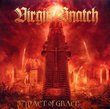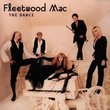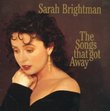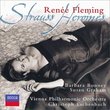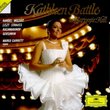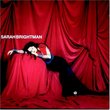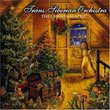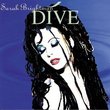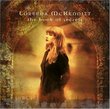| All Artists: Vanessa-Mae, Graham Broad, London Symphony Orchestra, Johann Sebastian Bach, Johannes Brahms, Ludwig van Beethoven, Max Bruch Title: The Classical Album 1 / Vanessa-Mae Members Wishing: 0 Total Copies: 1 Label: Angel Records Release Date: 11/12/1996 Genres: Dance & Electronic, Pop, Classical Styles: House, Euro Pop, Chamber Music, Forms & Genres, Concertos, Historical Periods, Baroque (c.1600-1750), Classical (c.1770-1830), Instruments, Strings Number of Discs: 1 SwapaCD Credits: 1 UPCs: 724355539526, 0724355539557, 0724355539502 |
Search - Vanessa-Mae, Graham Broad, London Symphony Orchestra :: The Classical Album 1 / Vanessa-Mae
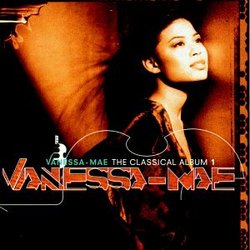 | Vanessa-Mae, Graham Broad, London Symphony Orchestra The Classical Album 1 / Vanessa-Mae Genres: Dance & Electronic, Pop, Classical
Vanessa-Mae started her career as a violin prodigy at age 10. Now, as an adult, she successfully straddles the worlds of classical and popular music. This has made her a sensation, but judging from this disc, the publicity... more » ![header=[] body=[This CD is available to be requested as disc only.]](/images/attributes/disc.png?v=430e6b0a) ![header=[] body=[This CD is available to be requested with the disc and back insert.]](/images/attributes/disc_back.png?v=430e6b0a) ![header=[] body=[This CD is available to be requested with the disc and front insert.]](/images/attributes/disc_front.png?v=430e6b0a) ![header=[] body=[This CD is available to be requested with the disc, front and back inserts.]](/images/attributes/disc_front_back.png?v=430e6b0a) |
Larger Image |
CD DetailsSynopsis
Amazon.com Vanessa-Mae started her career as a violin prodigy at age 10. Now, as an adult, she successfully straddles the worlds of classical and popular music. This has made her a sensation, but judging from this disc, the publicity surrounding her has nothing to do with either music or her playing. She is clearly a very talented violinist. Her technique is solid, sometimes even brilliant, but it's so old-fashioned that one cannot tell whether she slides so much because she likes it or because she can't find better fingerings, and her vibrato only gets wider when she tries to make it more intense. Her approach to the music is idiosyncratic, but shows no personal involvement or romantic feeling. The Brahms Scherzo and Bruch's Scottish Fantasia are aggressive and accented, rather than dramatic and passionate; the Beethoven Romance is sentimental, rather than expressive. The Third Bach Partita comes off best: though a bit stiff and stodgy, it has character and really dances. The program ends with her own pop-rock arrangement of the Fantasia's final Scottish song. The recording does not serve her well. Poor engineering makes her tone, though basically good, shrill and squeezed under stress; the piano sounds distant, but clangorous; the orchestra ragged and unbalanced. The booklet carries a skimpy biography and lots of hype, as well as a lengthy essay written by her that makes her sound arrogant, condescending, and defensive, though it is clear that she honestly aspires to be all things to all people. Also, it is printed in type so small as to be barely visible. --Edith Eisler Similar CDsSimilarly Requested CDs
|
CD ReviewsAbout as deep as a puddle R Nichols | Tempe, AZ United States | 12/28/2001 (2 out of 5 stars) "I respect Vanessa-Mae as an artist who has attracted public interest to the versatility of the violin in multiple genres. However, for a classically trained violinist, she seems to have forgotten her roots. While she demonstrates nearly flawless technique, that's pretty much all there is. Brief glimpses of musicality are its only saving grace. The Bach, especially, is excrutiatingly shallow. There's just not much to it. It is very immature for her supposed musicality. If you're looking for good unaccompanied Bach, try Heifitz-- a phenomenal standard --or even Hilary Hahn (her Bach is strikingly intuitive, despite her youth). Bottom line: She sounds bored, which makes it boring. If you're a hardcore V-M enthusiast, stick with the original, fiery, vamped-up Vanessa-Mae." Mae shows her cards Rod Saunders | Tulsa, Ok | 05/05/2004 (3 out of 5 stars) "With this album Vanessa Mae fans and classical violin connoisseurs now have the opportunity to judge her playing on its own merits as she covers standard classical violin repertoire rather than pop tunes or jazzed up versions of classical pieces. What we see is that Mae does indeed possess a considerable amount of technical ability and talent, even if her musicianship and tone are somewhat lacking. Mae excels with her Bach interpretations (Preludio and Loure were my favorites) where her ability to navigate the complexities of the cross string work and bowing challenges is displayed, but falls somewhat short in her efforts with Beethoven, Bruch, and Brahms where there is more demand for expression and musical maturity. There is a tendency in the world of classical music to dismiss artists who dabble in the world of pop music as shallow or phony. Often you see people malign every living violinist as unworthy heirs of the legacies of Heifetz, Oistrach, and Kreisler. These critics, of course, would rip into Vanessa Mae like a dog with a freshly grilled t-bone steak. The fact is, her playing isn't as good as die hard Mae fans would have you believe, nor is it as bad as the purists claim. This album isn't an attempt to gain credibility and widespread acceptance in the classical community, in my opinion, but rather an effort to introduce her loyal fans to the works of these great classical composers whom she apparently loves and admires. One thing she has proven is that an artist can succeed playing both pop and classical in their repertoire if they give a quality presentation of each in an entertaining fashion. This album is a part of that ongoing effort on Mae's part, and deserves to be judged as such and nothing more." Fabulous thinking music leosam116 | United States | 04/05/2001 (5 out of 5 stars) "I'm a fan of violin music, and I love baroque classical, but I'm only just learning about the talented musicians who record these timeless works today. So I cannot compare Vanessa-Mae's technical skills to those of any other musician.But I can say this -- this CD is fabulous thinking music, and is my favorite to play softly while I'm at work. The music is beautiful, uplifting, and calming, but with an undercurrent of energy that keeps me refreshed and invigorated for long hours in front of a computer. I can only guess that this energy comes from Vanessa-Mae's interpretation of the music. The variation of music on the CD builds in complexity -- from solo violin to violin/piano to violin with orchestra -- which builds the CD to a fabulous climax: Vanessa-Mae's enchanting, haunting, utterly inspiring arrangement of "I'm A-Doun For Lack O' Johnnie," which mixes the piece's Scottish roots with African rhythms, ethereal vocals, and -- of course -- Vanessa-Mae's heavenly violin.I now own two more Vanessa-Mae albums: *China Girl* and *The Violin Player.* China Girl again showcases Vanessa-Mae's fabulous violin-playing in music with distinctive Chinese flavor, as a tribute to her late grandfather and her Chinese heritage. It's beautiful but hasn't become as much of a favorite as *The Classical Album.* The Violin Player was Vanessa-Mae's first foray into pop violin, and it's groundbreaking in that respect -- very interesting and fun if you like pop and jazz.But this album is still my favorite. It's comforting like an old friend who always delivers the insightful, inspiring advice I need to hear."
|

 Track Listings (16) - Disc #1
Track Listings (16) - Disc #1
